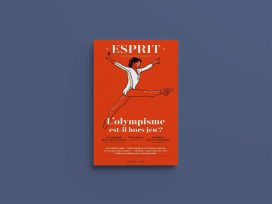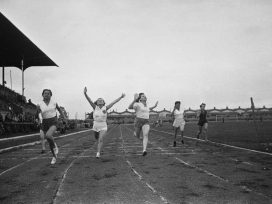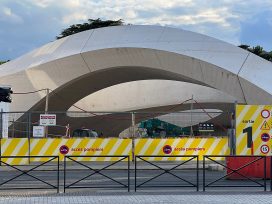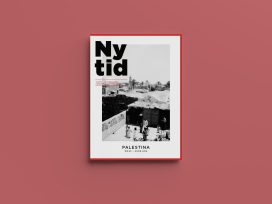22 June 1974: Political regimes habitually use major sporting events as platforms for propagandistic self-projection. Adolf Hitler and the Nazis made this abundantly clear in the 1936 Summer Olympics. Those games were degraded into a politically loaded mass spectacle at which even visiting athletes, supposedly out of deference toward the host country, often gave the “Hitler salute”. Thirty-eight years later, the same stadium in West Berlin is the venue for a number of the matches in the tenth FIFA World Cup championship. This time, leftwing demonstrators don’t pass up the opportunity to use the competition in the exact opposite sense: as a platform to protest against a military dictatorship.
The circumstances of this World Cup tournament are unusual for several reasons: it is the first final to be held in West Germany; it is the first time that the East German team has managed to qualify; and, due to the greatly increased fear of terrorism following the attack on the Israeli Olympic team two years earlier in Munich, security is heightened at the various matches. Security drills are planned, with dry runs of all possible scenarios, using game plans and exercises. Athletes’ quarters often resemble armed fortresses. There are even press reports that the Red Army Faction (RAF) is planning a rocket attack on People’s Park Stadium in Hamburg and that the IRA wants to carry out an attack on members of the Scottish national team. Nerves fray still further after news is released of a bomb threat against the GDR squad. Anxious security forces summarily cancel the planned visit of Yugoslavian president Josip Broz Tito. Security precautions are so extreme that when German Federal President Gustav Heinemann arrives in an armoured Mercedes 600 for the opening games in Frankfurt on 13 June, a mobile emergency operating room follows right behind.
Group I, whose matches will take place in West Berlin and Hamburg, is especially unusual. Here, the teams of West and East Germany will face off for the first time – and, as it turns out, the last. Also in the group are Australia and Chile. The latter’s participation means the representation of a country governed by a military dictatorship. The Chilean team owes its participation to somewhat scandalous circumstances. The Soviet Union had refused to play the return match in the qualifying round because the Chilean military had used the Estadio Nacional de Chile in the capital Santiago – the venue of the 1962 FIFA World Cup final – as a concentration camp, abusing, torturing and murdering thousands of political prisoners. On 20 November 1973, Austrian referee Erich Linemayr awarded the Chilean team “victory” in what was probably the most absurd international match ever held. In front of 15 000 spectators, mostly soldiers, the players ran out unopposed onto the pitch, kicked the ball around listlessly a few times and finally directed it into a deserted goal to make it 1:0. In this farce, athletes were once again occupying the locker rooms and lavatories which only recently had been used for interrogation and torture.
This prompts a number of Chile solidarity groups, founded across Germany shortly after the 11 September 1973 coup against Salvador Allende’s democratically elected Popular Front government, to resolve to let no appearance by the Chilean team on the World Cup-platform pass without expressing their outrage in view of the world media. The activists recognize from the outset that, should Chile fail to make it to the quarter-finals, they will have only three chances. About a dozen members of the Chile Solidarity Committee and the Socialist Work Collective (SAK-JUR), founded at the department of jurisprudence of the Berlin Free University, take charge of planning activities under the slogan “Chile Si, Junta No!” They plan a pitch invasion during Chile’s match at the Olympic Stadium, which is to be broadcasted on TV; banners will ensure that the protest is seen in Chile and hence that it will symbolically support the opposition. However, after inspecting the stadium, the activists realize that it will be extraordinarily difficult to stage such a protest. The pitch is separated from the spectators by Plexiglas barriers along with a deep trench designed to keep out interlopers. In addition, the activists have to assume that hundreds of plainclothes police officers will do everything in their power to immediately quell any attempts to disturb the match. At any rate, the likelihood of successfully crossing the trench is considered to be rather low.
 The kick-off for the protests is the 14 June match pitting West Germany against Chile. Members of the Solidarity Committee, including representatives of the “undogmatic left,” the Maoist League Against Imperialism and the Trotskyite Group of International Marxists (GIM), purchase about 1500 tickets. These are to be given or sold to demonstrators, who are to occupy entire blocks of seats, thus creating favourable conditions for their protest actions. As a West German army band begins to play the Chilean national anthem, a chorus in Block 41 east begins to chant “Chile Si, Junta No!” At the same time, Junta-opponents unfurl the flags and banners that they have managed to smuggle past the security checks. One flag measures at least 6 by 4 meters and is stretched out over dozens of spectators like a tent. For several minutes, all attention in the broad oval of the stadium turns towards the demonstrators. A loud chorus of whistling reveals that the protest does not exactly fall on sympathetic ears among most West German fans. This, or the fact that police with helmets and batons have made their way to Block 41, hardly seems to perturb the protestors. While the police manage to wrest from a group of demonstrators a banner on which the “CH” in “PINOCHET” has been replaced by a swastika that is clearly visible from a distance (the public display of the swastika is illegal in Germany – ed.), they are utterly unable to extinguish all the smaller protest actions flaring up around the stadium.
The kick-off for the protests is the 14 June match pitting West Germany against Chile. Members of the Solidarity Committee, including representatives of the “undogmatic left,” the Maoist League Against Imperialism and the Trotskyite Group of International Marxists (GIM), purchase about 1500 tickets. These are to be given or sold to demonstrators, who are to occupy entire blocks of seats, thus creating favourable conditions for their protest actions. As a West German army band begins to play the Chilean national anthem, a chorus in Block 41 east begins to chant “Chile Si, Junta No!” At the same time, Junta-opponents unfurl the flags and banners that they have managed to smuggle past the security checks. One flag measures at least 6 by 4 meters and is stretched out over dozens of spectators like a tent. For several minutes, all attention in the broad oval of the stadium turns towards the demonstrators. A loud chorus of whistling reveals that the protest does not exactly fall on sympathetic ears among most West German fans. This, or the fact that police with helmets and batons have made their way to Block 41, hardly seems to perturb the protestors. While the police manage to wrest from a group of demonstrators a banner on which the “CH” in “PINOCHET” has been replaced by a swastika that is clearly visible from a distance (the public display of the swastika is illegal in Germany – ed.), they are utterly unable to extinguish all the smaller protest actions flaring up around the stadium.
An evening gathering is held to celebrate the successful protest at this first match, at which slides of the events are shown. The next day, following a rally at which the British-Pakistani Trotskyist Tariq Ali has been speaking, 7000 people respond to the appeal to join a march organized by the Chile Solidarity Committee. It leads to the Hotel Schweizer Hof, the organizational and media headquarters of the World Cup. While the Uruguayan singer Daniel Viglietti performs Latin-American songs in front of the building, a delegation manages to enter the hotel and present a resolution against the suppression of anti-Pinochet protests. Their next opportunity comes three days later, with the Chile vs. East Germany match. Although 3000 fans have been brought in from East Berlin in special trains, the stadium is not even half full; there are only 30 000 spectators. About 1800 police are charged with keeping the peace, lest unnecessary tensions exacerbate inter-German relations. A deafening chorus of whistles practically drowns out the GDR anthem, sending the unmistakable message that this, too, is no normal World Cup match. This time, security precautions are drastically intensified. Not one demonstrator manages to smuggle a banner into the stadium. There are too many body searches by the security forces, and the inspections are strict.
But the protesters are not easily discouraged. Just in case, they have prepared a substitute protest: activists wearing yellow raincoats arrange themselves in the stands so as to form a giant swastika. The fact that the Socialist Unity Party of West Berlin (SEW), the meaningless pendant to the East German SED, has refused to take part in any protests is a particular bone of contention for the “undogmatic” group. Chanting slogans such as “Chile Socialista” and “Freedom for Luis Corvalan”, the communist party president jailed in Chile, they simultaneously attempt to provoke a response from the GDR fans. These nevertheless seem deaf to such slogans and are heard chanting only “Eight, nine, ten, super!” Evidently they are obeying strict instructions to avoid political activities that might “disturb” or “discredit” their team’s first successful participation in a World Cup tournament. When this game, too, concludes with no spectacular pitch protest, few of the protest organizers believe their original plans can be realized.
Their last chance comes on 22 June, with Chile’s game against Australia, supposedly the least interesting of the group matches. This time, the junta protesters benefit from a stroke of luck: a downpour begins shortly after the whistle for the second half, causing even undercover police in their tracksuits to run for cover. In the confusion, the activists grab their chance. Without hesitating, they surge forward, breach the trench and – already soaked to the skin – run completely unhindered onto the middle of the pitch. There, to the obvious dismay of the referee, they unfold a Chilean flag bearing the words “CHILE SOCIALISTA”. At first, the police, who supposedly number 1600 along with an unknown number of plainclothes officers, seem completely taken by surprise. The referee stops play. When a police unit finally runs over from the other side, the demonstrators give up and do not resist being removed – secure in the knowledge that they have achieved what they set out to do. Eleven students are taken to the detention centre set up by the Charlottenburg police station on the Kaiserdamm. They are to be charged with trespass. After their personal data is recorded, they are released.
That evening, the protesters learn that their interruption of the game was broadcasted live on Chilean TV. Like Berlin’s police, the junta’s media authorities appeared at first to have been caught off guard by the protest. After a few minutes they decided to interrupt the broadcast and superimpose a notice announcing a “technical difficulty”. Two days later, the daily newspaper Die Welt comments on the events with what sounds like disappointment: “Only three goals were scored in three World Cup games played in the Olympic Stadium. The police contributed two ‘own goals’ to the tournament: first, with insufficient protection for the Chilean consulate, which was attacked on 12 June; then on Saturday, when demonstrators managed to exploit the Berlin World Cup final for political purposes.”
The success of protest cannot belie the real situation in Chile. One day later, on 25 June, the military junta in Santiago de Chile declares General Augusto Pinochet Ugarte the “Supreme Chief of the Nation”, in effect appointing him president. The putschists are more firmly in the saddle than ever. Their abolition of democracy, carried out with active assistance from the USA, has in the first weeks after 11 September already cost some 3000 Chileans their lives. More than 10 000 more people are arrested and will have an uncertain fate hanging over them for years to come.

 The kick-off for the protests is the 14 June match pitting West Germany against Chile. Members of the Solidarity Committee, including representatives of the “undogmatic left,” the Maoist League Against Imperialism and the Trotskyite Group of International Marxists (GIM), purchase about 1500 tickets. These are to be given or sold to demonstrators, who are to occupy entire blocks of seats, thus creating favourable conditions for their protest actions. As a West German army band begins to play the Chilean national anthem, a chorus in Block 41 east begins to chant “Chile Si, Junta No!” At the same time, Junta-opponents unfurl the flags and banners that they have managed to smuggle past the security checks. One flag measures at least 6 by 4 meters and is stretched out over dozens of spectators like a tent. For several minutes, all attention in the broad oval of the stadium turns towards the demonstrators. A loud chorus of whistling reveals that the protest does not exactly fall on sympathetic ears among most West German fans. This, or the fact that police with helmets and batons have made their way to Block 41, hardly seems to perturb the protestors. While the police manage to wrest from a group of demonstrators a banner on which the “CH” in “PINOCHET” has been replaced by a swastika that is clearly visible from a distance (the public display of the swastika is illegal in Germany – ed.), they are utterly unable to extinguish all the smaller protest actions flaring up around the stadium.
The kick-off for the protests is the 14 June match pitting West Germany against Chile. Members of the Solidarity Committee, including representatives of the “undogmatic left,” the Maoist League Against Imperialism and the Trotskyite Group of International Marxists (GIM), purchase about 1500 tickets. These are to be given or sold to demonstrators, who are to occupy entire blocks of seats, thus creating favourable conditions for their protest actions. As a West German army band begins to play the Chilean national anthem, a chorus in Block 41 east begins to chant “Chile Si, Junta No!” At the same time, Junta-opponents unfurl the flags and banners that they have managed to smuggle past the security checks. One flag measures at least 6 by 4 meters and is stretched out over dozens of spectators like a tent. For several minutes, all attention in the broad oval of the stadium turns towards the demonstrators. A loud chorus of whistling reveals that the protest does not exactly fall on sympathetic ears among most West German fans. This, or the fact that police with helmets and batons have made their way to Block 41, hardly seems to perturb the protestors. While the police manage to wrest from a group of demonstrators a banner on which the “CH” in “PINOCHET” has been replaced by a swastika that is clearly visible from a distance (the public display of the swastika is illegal in Germany – ed.), they are utterly unable to extinguish all the smaller protest actions flaring up around the stadium.




